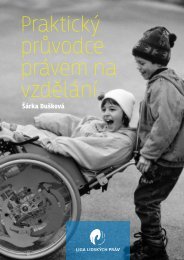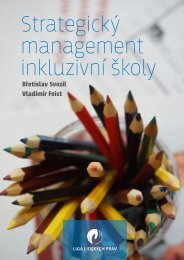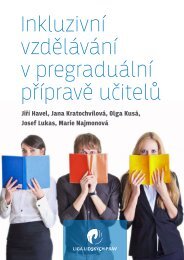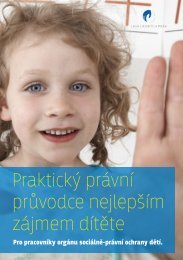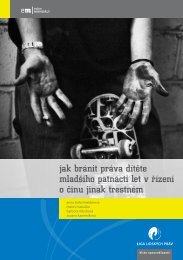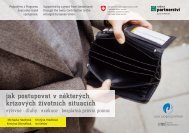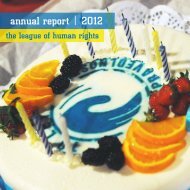EXTRA league papers | issue 3 | winter 2010 | What Schools Do We Want for our Children?
You also want an ePaper? Increase the reach of your titles
YUMPU automatically turns print PDFs into web optimized ePapers that Google loves.
2<br />
introduction<br />
Olga Kusá, educational specialist in the Inclusive<br />
Education Support Centre in Brno<br />
we should have<br />
diversity in<br />
schools… or did i<br />
go mad?<br />
I like my job. I really do. Thanks to my<br />
job I got to know those schools where<br />
diversity is accepted, respected and<br />
even welcomed as good experience and<br />
benefi cial <strong>for</strong> all. But just like all other<br />
jobs it has its dark side that can get on<br />
my nerves!<br />
Have you ever wondered how some people<br />
can be so thick-headed? Have you ever felt you<br />
were the only one trying to make something<br />
happen? Have you ever felt like exploding<br />
because you were being told again and again<br />
why some things cannot be done instead of<br />
trying to fi nd solutions? <strong>What</strong> can surely make<br />
me see red is the stiff ness of opinions of education<br />
workers whose simplifying and black<br />
and white judgements aff ect the education of<br />
“diff erent” children. Psychologists and specialized<br />
teachers are the ones who establish the<br />
“diagnosis”, on which basis a child is recommended<br />
<strong>for</strong> integration into a regular school or<br />
sent to a special school. Educational counsellors<br />
cooperate with teachers and advise them<br />
how to work with children who have a learning<br />
disability. These people can have an essential<br />
impact on the future of children and their authority<br />
can aff ect the minds of teachers. I have<br />
recently had an opportunity to participate in<br />
a discussion between educational counsellors<br />
and teachers at a standard elementary school.<br />
The subject of the discussion was the education<br />
of so-called problematic pupils. I was happy<br />
about the event, I was interested in the problems<br />
teachers had and curious to know how<br />
the educational counsellors would deal with<br />
the multitude of questions and complaints.<br />
But to my bitter disappointment, at the very<br />
beginning the lead psychologist unblinkingly<br />
said: “It is a shame that it is no longer allowed to<br />
send border children to <strong>for</strong>mer special schools.<br />
Such children will now come fl ooding into y<strong>our</strong><br />
schools! I am really curious to see how you will<br />
manage it.”<br />
Imagine my despair, my job is to motivate teachers<br />
not to give up on and get rid of less able<br />
children, no matter how diffi cult the work with<br />
them can be. “Border children” is a simplifi ed<br />
term describing children whose results in IQ<br />
tests border on mild intellectual disabled. These<br />
children do not do well in school and there<br />
are many reasons why it is so. However, I think<br />
that these children do not belong to schools<br />
<strong>for</strong> the intellectually disabled.<br />
Nevertheless, the discussion goes on. And with<br />
it come other shocking words spoken by an<br />
educational counsellor: “It is time we really started<br />
to fear children with behavi<strong>our</strong>al disorders,<br />
as their number rises. An unruly child cannot be<br />
changed, nothing works <strong>for</strong> them.”<br />
But the best of educational optimism is yet to<br />
come: “There is nothing you can do with border<br />
children; they will not start getting better. Let<br />
them fail the end of year exams and they might<br />
end up at a special school anyway.”<br />
This experience was stuck in my head long afterwards<br />
and I was thinking about the psychologist.<br />
A change can be diffi cult and attitudes<br />
are especially hard to change. Maybe she has<br />
twenty or thirty years of experience, feels sure<br />
about what she does and nothing can easily<br />
surprise her. “It has been working fi ne until now,<br />
so what do you want?!” “A change?” I ask. Or did<br />
I really go mad?<br />
Lucie Obrovská, lawyer of the Equal Opportunities<br />
Department of the Offi ce of the Public Defender<br />
of Rights<br />
three year “anniversary”<br />
of the<br />
d. h. verdict: have<br />
we moved on?<br />
The Czech Republic has committed to<br />
ensuring equal access to education. Since<br />
last year this right has been grounded<br />
not only in the Charter of fundamental<br />
rights and basic freedoms, education<br />
rules and international obligations but<br />
also in the Anti-discrimination Act.<br />
When non-governmental organizations recently<br />
criticized the Minister of Education <strong>for</strong> his<br />
indifference towards the <strong>issue</strong> of integration<br />
and inclusion, they pointed out the possibility<br />
of another action being brought against the<br />
Czech Republic at the European C<strong>our</strong>t of Human<br />
Rights in Strasb<strong>our</strong>g. In 2007 in the case of D.<br />
H. and others vs. the Czech Republic the same<br />
c<strong>our</strong>t stated that we discriminate against Roma<br />
children because we do not provide them with a<br />
standard quality education, i.e. education given<br />
to non-Roma children. Instead, a great number<br />
of Roma children are placed in non-standard<br />
schools. But according to the current legislation,<br />
only disabled children should be provided with<br />
such education. In <strong>We</strong>stern countries it is quite<br />
common that emphasis is put on coeducation<br />
of all children, regardless of their disability. Inclusion<br />
is good not only <strong>for</strong> the education of the<br />
diff erent, disabled child but it also improves the<br />
child’s relationship with majority children, who<br />
thus learn tolerance.<br />
Special changes at special schools or<br />
Czech-style inclusion<br />
Although special schools were to be removed<br />
from the education system, anyone in this fi eld<br />
will confirm that the change of the schools’<br />
naming was merely symbolic. Special schools<br />
were renamed practical elementary schools but<br />
the change in the concept of education, which<br />
would support the inclusive approach, did not<br />
happen. It is appalling that three years later legal




